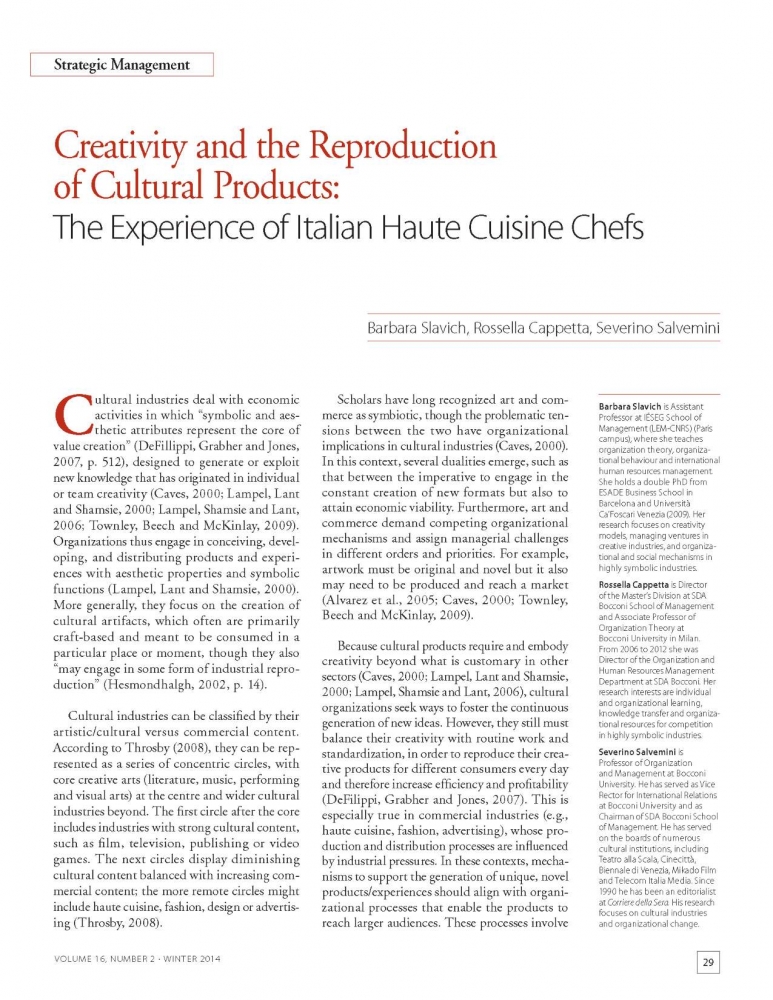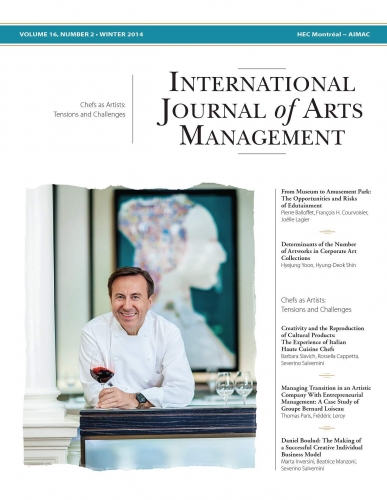Creativity and the Reproduction of Cultural Products: The Experience of Italian Haute Cuisine Chefs
Produit: Article
21,00 $ CA
Barbara Slavich, Rossella Cappetta, Severino Salvemini
Barbara Slavich is Assistant Professor at IÉSEG School of Management (LEM-CNRS) (Paris campus), where she teaches organization theory, organizational behaviour and international human resources management. She holds a double PhD from ESADE Business School in Barcelona and Università Ca’Foscari Venezia (2009). Her research focuses on creativity models, managing ventures in creative industries, and organizational and social mechanisms in highly symbolic industries.
Rossella Cappetta is Director of the Master’s Division at SDA Bocconi School of Management and Associate Professor of Organization Theory at Bocconi University in Milan. From 2006 to 2012 she was Director of the Organization and Human Resources Management Department at SDA Bocconi. Her research interests are individual and organizational learning, knowledge transfer and organizational resources for competition in highly symbolic industries.
Severino Salvemini is Professor of Organization and Management at Bocconi University. He has served as Vice Rector for International Relations at Bocconi University and as Chairman of SDA Bocconi School of Management. He has served on the boards of numerous cultural institutions, including Teatro alla Scala, Cinecittà, Biennale di Venezia, Mikado Film and Telecom Italia Media. Since 1990 he has been an editorialist at Corriere della Sera. His research focuses on cultural industries and organizational change.
ABSTRACT
The authors explore the organizational challenges of managing creativity and reproducing creative products in cultural industries. They examine the processes and mechanisms that support the generation of new ideas while also clarifying methods for the accurate reproduction of creative products and determining how these efforts might be balanced. Through their study of two haute cuisine restaurants, the authors reveal how creativity can be fostered and implemented in chefs’ daily activities. They highlight the importance of codification, knowledge “teachability,” input, output and behavioural controls for guaranteeing accurate reproduction of creative products and/or experiences.
KEYWORDS
Haute cuisine, creativity, reproduction, codification
RÉSUMÉ
Les auteurs explorent les défis organisationnels liés à la gestion de la créativité et à la reproduction de produits créatifs dans les industries culturelles. Ils examinent les processus et les mécanismes qui appuient la génération de nouvelles idées et ils décrivent les méthodes de reproduction fidèle des produits créatifs, montrant comment ces différents éléments peuvent s’équilibrer. À travers leur étude portant sur deux restaurants de haute gastronomie, les auteurs révèlent comment la créativité peut être stimulée et mise en œuvre dans les activités quotidiennes des chefs. Ils font ressortir l’importance de la codification, de l’aptitude à apprendre ainsi que du contrôle des résultats et des comportements afin de garantir la reproduction fidèle des produits créatifs ou des expériences.
MOTS CLÉS
Haute gastronomie, créativité, reproduction, codification
RESUMEN
Los autores exploran los retos organizacionales asociados a la gestión de la creatividad y a la reproducción de productos creativos a los que se enfrentan las industrias culturales. En el artículo se examinan los procesos y mecanismos que fomentan la generación de nuevas ideas a la vez que se explican los métodos utilizados para realizar una reproducción fiel de productos creativos y se determina cómo lograr un equilibrio entre estos esfuerzos. Mediante un estudio de dos restaurantes de alta gastronomía, los autores destacan cómo se puede atizar y poner en práctica la creatividad en las actividades diarias de los chefs y ponen también de relieve la importancia de la codificación, la transferencia de conocimientos, los insumos, el producto final y los controles de comportamiento para garantizar la fiel reproducción de productos o experiencias creativas.
PALABRAS CLAVE
Alta gastronomía, creatividad, reproducción, codificación

